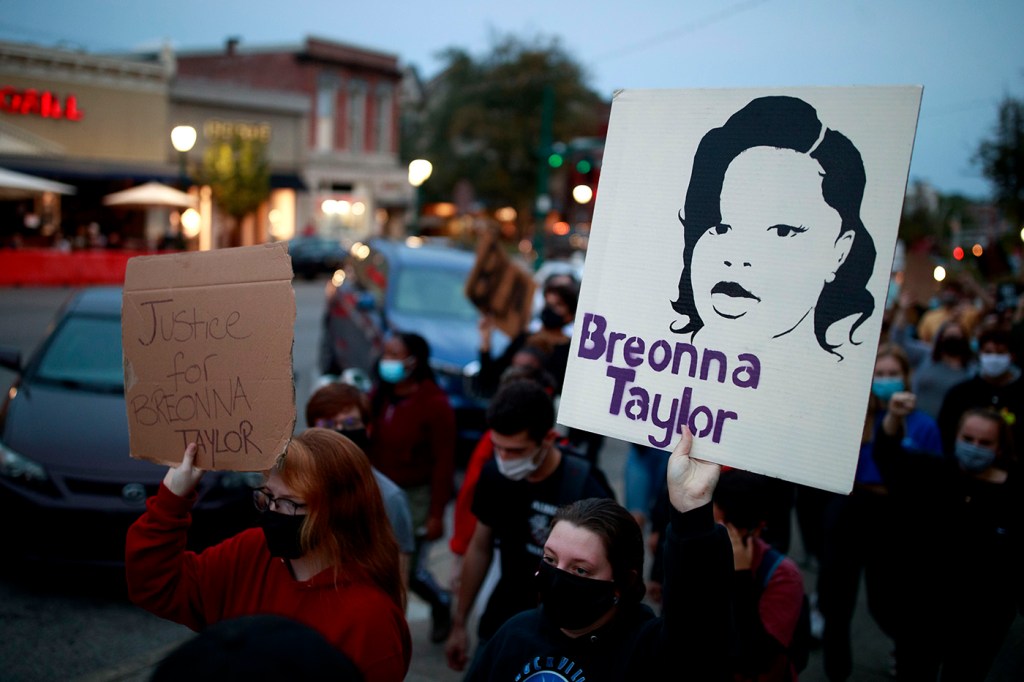Police weren’t indicted for the killing of Breonna Taylor. What happened?

A grand jury didn’t indict any police officers in connection with the killing of Breonna Taylor in her apartment, and charged one former detective with wanton endangerment—an outcome that’s likely as much the result of the evidence that prosecutors from the Kentucky Attorney General’s office chose to present as what they didn’t, says Daniel Medwed, university distinguished professor of law and criminal justice at Northeastern.
“A grand jury is a prosecutor’s game,” Medwed said, hours after Attorney General Daniel Cameron announced the jury’s decision Wednesday. “The prosecution can present whatever type of evidence they want, and in most cases, it’s fairly straightforward for prosecutors to get an indictment if they want it.”

Daniel Medwed is university distinguished professor of law and criminal justice at Northeastern. Photo by Matthew Modoono/Northeastern University
The case—in which Taylor, a Black woman and medical worker, was shot and killed by three police in March during a botched raid on her apartment—has attracted national attention, and Wednesday’s announcement that a grand jury would not seek criminal charges ignited protests in cities across the United States.
“There’s an old saying that prosecutors could indict a ham sandwich if they want to,” Medwed said. “But by the same token, if prosecutors don’t want to indict someone, they could soft-pedal the evidence in a way that will ensure it. I’ve seen it happen time and time again with cases like this.”
Medwed acknowledged that it’s impossible to know exactly what evidence was presented and how, because pre-trial grand jury proceedings aren’t open to the public.
But, he says: “The silence here speaks volumes. My guess would be that the prosecutors were less assertive, less aggressive, and more balanced in providing evidence because a police officer was involved.”
In his statement Wednesday, Cameron said the officers who fired their weapons at Taylor were justified in using force to protect themselves after they were shot at by her boyfriend.
According to reports, shortly after midnight on March 13, Louisville police officers used a battering ram to knock down the door to Taylor’s apartment. They had a warrant to search her apartment under the suspicion that two men selling drugs had used it to receive packages. Taylor had severed ties with the man police suspected.
At the time, Taylor was asleep in bed with her boyfriend, Kenneth Walker. Hearing the commotion, Walker, a registered gun owner, feared the apartment was being broken into. He fired one shot of his pistol and hit a police officer, Jonathan Mattingly, in the leg.
Mattingly and two other officers, Brett Hankison and Myles Cosgrove, returned fire and shot more than 20 rounds, ultimately killing Taylor.
A grand jury did charge Hankison, who was fired from the Louisville police force over the summer, with three counts of wanton endangerment, a class D felony in Kentucky that carries up to a five-year sentence.
The charge is “comparable to extreme recklessness,” Medwed said.
Cameron said that Hankison fired 10 shots, none of which are known to have hit Taylor. Instead the charges arise because some of the shots went through Taylor’s walls and into the neighboring apartment, endangering three people there.
“What is alarming to me about this,” Medwed says, “is that Breonna Taylor was shot and killed by the police, but the only Kentucky state charges relate to one officer firing his gun and endangering her white neighbors next door.”
During his announcement, Cameron said that the Federal Bureau of Investigation is examining whether any of the three officers committed any federal crimes, such as violating Taylor’s civil rights.
In other words, Medwed said, “Just because Jefferson County hasn’t issued a state court indictment doesn’t mean there won’t be federal charges.”
For media inquiries, please contact Shannon Nargi at s.nargi@northeastern.edu or 617-373-5718.





